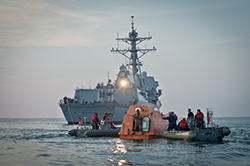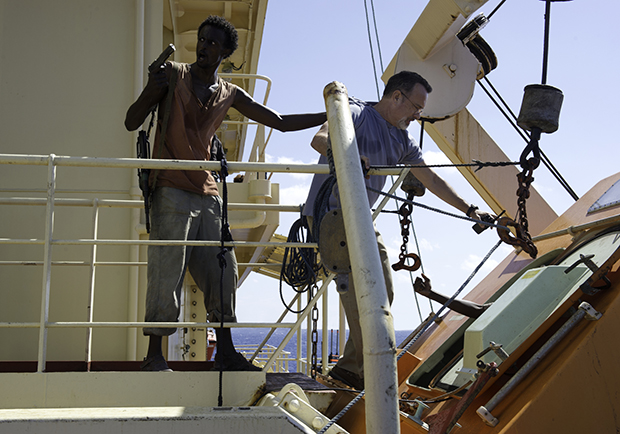The final fifteen minutes of Paul Greengrass's Captain Phillips are among the most intense I have seen in any movie in years (particularly the final scene). Certainly, the whole 134 minutes—though it feels like 90 minutes or less—is intense. But its climax and catharsis are breathtaking. It left me feeling shaken, inspired, grieved, and shell shocked, with a distinct sense of "what just happened?!"
And that's an all-too-rare feeling in movies today.
I felt the same way seven years ago when I sat in a theater watching another film by Paul Greengrass that ended with a breathless bang and a similar, albeit more tragic, climactic catharsis: United 93. That film, one of the decade's best, left me so shaken I could hardly move from my seat when the credits began to roll.
The final moments of Captain Phillips include a career-best acting moment from Tom Hanks, but its final scene also reminded me of what Paul Schrader, in Transcendental Style in Film, calls stasis: the moment at the end of the film (usually the last shot) when the "abundant," loud, and chaotic give way to "sparse," quiet, and contemplative finality. To put it another way: Captain Phillips is hardly Ozu in form or in content. But the way it ends certainly leads the viewer to place of stasis that reminds one of the Japanese director's work: "a frozen view of life," notes Schrader, "which does not resolve the disparity but transcends it."
The amazing thing is that Captain Phillips, like United 93, is based on a true story that most of the audience knows. That a story with a known ending can be so gripping—even sublime—is a testament both to the filmmakers' talents and film's inherent power to narrate real stories more viscerally than the newspaper or a Wikipedia page.
 Jasin Boland / Columbia Pictures
Jasin Boland / Columbia PicturesCaptain Phillips depicts the 2009 events surrounding the hijacking by Somali pirates of the Maersk Alabama and the subsequent kidnapping-for-ransom of the ship's merchant marine captain, Richard Phillips (Hanks). Aside from a puzzling stateside prologue in which Catherine Keener makes a brief cameo as Phillips' wife, the film takes place entirely at sea in the dangerous waters off the coast of Somalia.
Phillips has a happier ending than United 93, but the two films have a striking amount in common. Both are set mostly in confined, claustrophobic transportation spaces—a lifeboat and an airplane—with limited contact with the outside world. Both feature largely unknown casts (aside from Hanks). Both are made in a cinéma vérité style of gritty, jittery realism. Both get very loud—nay, cacophonous—in their final, heart-stopping minutes. And both showcase the violent clashes of cultures, as well as the might of the American military industrial complex.
Both United 93 and Captain Phillips also feature two specific people groups engaged in a battle that acts as a proxy for a much larger, more complex existential collision. They are random airline passengers whose fates collide with those of bin Laden's recruits, or they are everyday sailors doing their jobs one minute and fending off warlord-employed Somali hijackers the next.
The seeds of these conflicts are complex—and a two-hour film can't adequately explore the religious, economic, and cultural forces involved. Some will be dissatisfied with this. But it seems clear that these aren't dissertations about the roots and contexts of historic events, as much as the phenomenological realities of them: the collision-ness of the cultural collision.
As such, it's hard to see the antagonists in Captain Phillips as villains. Yes, they are criminals. Yes, they are perhaps asking for whatever vengeance the U.S. Navy unleashes on them. But they are also people in desperate need of an income and with increasingly few options at their disposal.
Greengrass and his Somali-American actors (particularly the excellent Barkhad Abdi) do a great job humanizing these men without sympathizing with their choices. As pirate ringleader Muse, Abdi lends his character an understated complexity informed by rage, naiveté, and an almost camaraderie with the captive Phillips, whom he calls "Irish." When Phillips tells him that "there's gotta be something [for you] other than fishing and kidnapping people," Muse responds, "Maybe in America, Irish—maybe in America."
 Columbia Pictures
Columbia PicturesIndeed, one of the sobering things about CaptainPhillips is how vividly it shows the gulf between "have" and "have not" countries like America and Somali. The sheer scope of the U.S. military power on display—pitted against four ragtag Somali hijackers—is mind-boggling. Multiple Navy ships, spy planes, helicopters, intelligence officers, and an elite Navy Seal team are unleashed on a fairly incompetent, amateur gang of Somali teenagers. Sure, it's exciting to see the Seals do their thing (between this and last year's Zero Dark Thirty, Seal Team Six is enjoying quite the run of Hollywood PR), but at times it does feel a bit (pardon the maritime pun) overboard. Of course it's impossible to put a price tag on a human life, but the amount of money spent by the U.S. to rescue Captain Phillips must have been astronomical.
The brilliance of Captain Phillips, though, is that it lets the audience ask its own questions and come to its own conclusions about this episode in history. Is it simply an isolated tale of real-life drama on the high seas, or are there more systemic, troubling issues at its core?
These aren't for Greengrass to answer (or really for us to ponder much) in the moment of watching what is first-and-foremost a visceral experience. But when the smoke clears and the choppy waves (and camerawork) steady a bit, Phillips leaves us with much to contemplate about life, death, and the fateful moments when—on a boat, in a plane, or wherever you least expect it—everything is at stake.
Caveat Spectator
Captain Phillips is not for the faint of heart, not because it is especially gruesome or bloody (by the standards of the genre, it isn't) but because it is just incredibly intense. For this reason, and because there are a few profanities and just a pervasive sense of dread, this is probably not a movie for young, sensitive, or seasickness-prone viewers.
Brett McCracken is a Los Angeles-based writer and journalist, and author of the books Hipster Christianity: When Church and Cool Collide (Baker, 2010) and Gray Matters: Navigating the Space Between Legalism and Liberty (Baker, 2013). You can follow him @brettmccracken.










